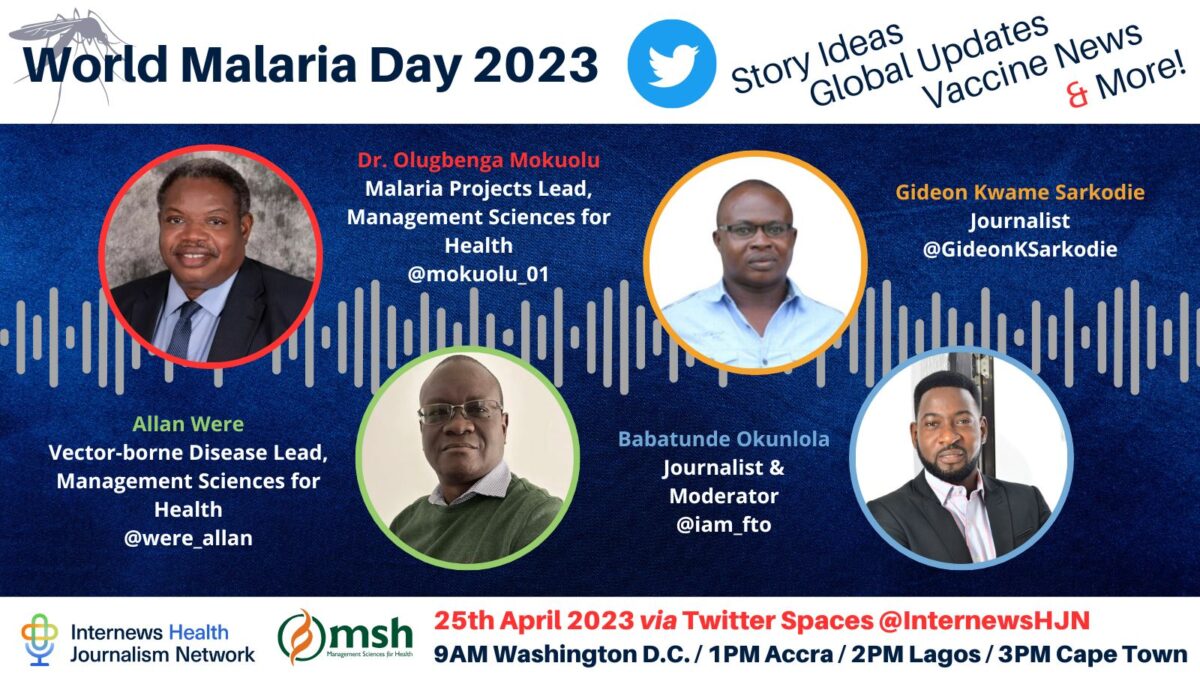By Sydney Blakeney

On April 25th, The Internews Health Journalism Network, in collaboration with Management Sciences for Health (MSH), recognized World Malaria Day with a dynamic Twitter Spaces event moderated by HJN member and Nigerian radio journalist, Babatunde Okunlola. Three African panelists discussed three priority areas in the ongoing fight against malaria: the role journalists have in malaria prevention and awareness at a community level, how journalists can better work alongside scientists and researchers to prioritize malaria as a newsworthy health issue in impacted communities, and, how journalists can help to inspire confidence and increase uptake of the malaria RTS,S vaccine amongst young children in high-risk communities.
Africa as the last fortress of malaria
Dr Olugbenga Mokuolu , Malaria Projects Lead with MSH, provided key insight on the fight against malaria in Africa, stating that “Africa is like the last fortress of malaria. It is responsible for 95% of the global 247 million cases reported in 2021.” Tremendous progress has been made in the fight against malaria since 2001, as 1.5 billion cases were averted globally, 82% being in Africa. With the massive scale up of interventions such as insecticide treated nets, rapid diagnostic tests, treatment access for severe cases, 94% of 11.7 million deaths were averted in Africa.
However, despite these efforts, malaria remains a primary cause of childhood illness and death in sub-Saharan Africa. And with the threat of climate change, malaria along with other vector borne diseases are showing more frequent outbreaks in places where the disease has been eradicated.
Climate change fuels vector-borne disease
“[Climate change] is the biggest threat to vector borne diseases such as malaria,” Alan Ware, vector-borne disease lead with MSH, describes. “As places get warmer, mosquitos thrive and move to new places where populations don’t have strong natural immunity… and the tools and interventions put in place that have been influential in previous years would ultimately be compromised, as the environments they were designed to work in originally will undergo severe changes in the coming years.” This ultimately puts a burden on health systems and creates more challenges in treating the virus in communities. Ware urges collaboration between stakeholders to anticipate these threats and to accurately detect and track how vectors are spreading to respond quickly.
This year, the WHO marked the theme of World Malaria Day as “Time to deliver zero malaria; invest, innovate, implement.” Alongside the announcement of the WHO’s discovery of the first malaria vaccine, the landscape of the fight against malaria is primed for change.
“The roles of experts, journalists and NGOs in malaria prevention are critical. We cannot survive without each other; we are extremely independent. The information space is as important as any other action as you are carrying out on malaria.”
Dr Olugbenga Mokuolu
Journalists have a part to play
But what role can journalists play in the fight to eliminate malaria globally and promoting vaccine uptake?
Ghanian journalist and HJN member Gideon Kwame Sarkodie emphasizes the need for more journalists to report on health. Journalists play a key role in reaching communities and sharing information on malaria and the necessity of vaccine uptake. However, journalists themselves face issues with accessing the very information they’re reporting on, as the scientific community rarely collaborates with the media to discuss these issues. Sarkodie recognizes the importance of media by stating, “malaria is a shared burden – the media, whether we’re invited or not, need to find a way to put ourselves in the problem.”
In addition to collaborating with scientists, journalists must also prioritize reporting on malaria. Sharing new and underreported stories is important to maintaining engagement in the communities overall. Reporting on solutions and progress made on the community levels. Ware emphasized the importance of journalists to develop trust on a community level while reporting on these issues. The panelists also gave multiple story recommendations to report on the community level and maintain engagement, such as:
- How are local communities experiencing and treating malaria? What are the uses of unorthodox/herbal treatments? Are local communities testing for malaria prior to treatment?
- What efforts are community health professionals taking to get to “hard to reach” communities?
- How are communities owning the elimination process of malaria? What sanitation methods are they using?
- What is the demand at the community level for the rollout of the malaria vaccine? Are communities experiencing vaccine hesitancy in large numbers?
Listen to the full recording: click here.